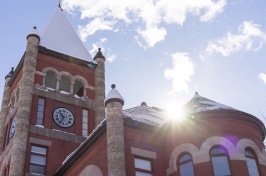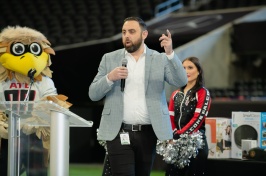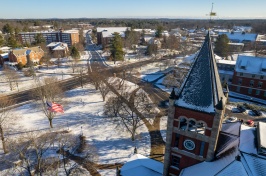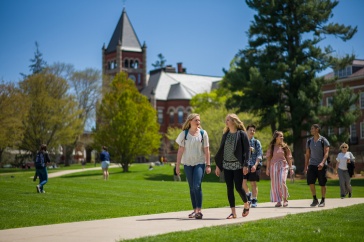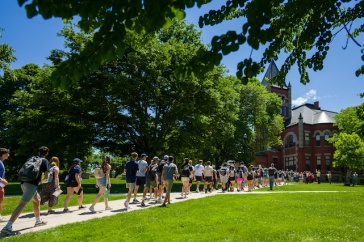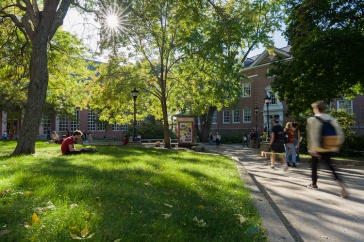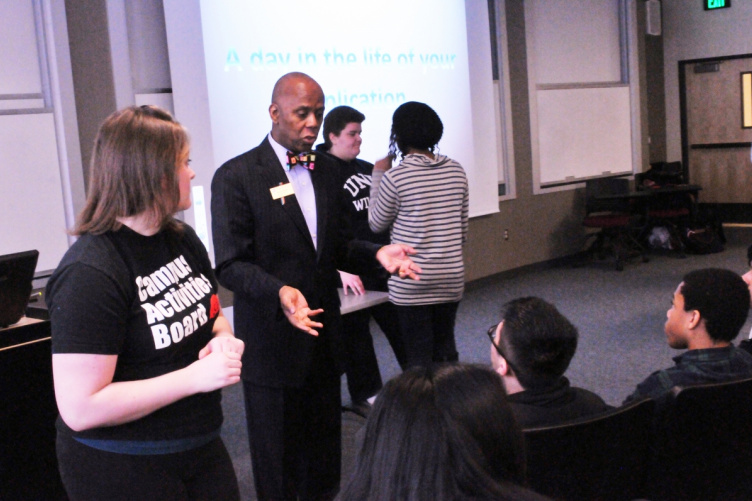
Don't go to school anymore. Wake up in the morning and go to work.
That was the advice from Richard Haynes, assistant director of admissions for diversity at UNH, who spoke to a group of nearly 100 high school sophomores and juniors who were visiting campus last week.
Haynes told the students about "my struggles," as he dubbed his story. Growing up in the Deep South, poor and under the burden of discrimination, his parents moved the family as part of the Great Migration to Harlem. It was supposed to be a fresh new start. But it wasn't the move to paradise that the young boy had imagined.
It was during his inner-city childhood, living in an apartment infested with rats, amid a collection of drug addicts and dealers in the neighborhood, Haynes says, that he learned what he repeats now as a mantra for young adults: "Life is not promised to be easy, but better — only if you make it better."
The students were on campus as part of the TRiO Program, a federal program that promotes educational equality and provides educational opportunities regardless of race, ethnic background or economic circumstance, especially targeting low-income and first-generation college students and those with disabilities.
"When you think about it, when we look at a great deal of these students, I tell them my story because maybe some of them are coming from the same place, and I want them to believe in themselves and have hope ... if I can do it, they surely can," Haynes says. That's why he's advising high-schoolers to start thinking about their schooling as a job, and to take it seriously.
For the visiting students, it was a chance to hear more about UNH, and to begin to hone their focus on a college education.
"For many of these students, this is their first time past Boston. It's a totally different environment than where they come from," says Karry Ballard, director of Upward Bound of Stamford, Conn. "We want the students to be thinking not only 'Why college?' but also 'Why education?' We want them to realize the impact it could have on their lives and expose them to places they've never been to meet and talk with people who look nothing like them."
The visiting students, who hailed from Stamford (Conn.) High School and several locations in Massachusetts, took campus tours and enjoyed lunch in Holloway Commons before boarding their buses and heading north to New England TRiO Day 2015 in Portland, Maine. According to Randy Schroeder, counselor and coordinator of UNH’s TRiO/Student Support Services programs, the two-day conference hosted some 400 students and staff from 31 different groups throughout New England.
Schroeder, who is also president of the New England Educational Opportunity Association, says the day is intended to equip pre-college TRiO students with information about academic preparation for higher education, the processes of college admission, cultivating leadership skills, financial aid and financial literacy, student engagement, social and cultural capital skill building, building a personal and professional network and career development. TRiO alumni share their stories and wisdom of the world, Schroeder says.
More About TRiO and UNH |
| The federal TRiO program was established in 1965. |
| More than 850,000 low-income, first-generation students and students with disabilities are served by more than 2,800 TRiO programs nationally. |
| Eligibility is determined by federal guidelines, and program is funded by the U.S. Department of Education through a grant process. |
| At UNH, TRiO programs and Student Support Services include the McNair Scholars Program, Upward Bound and Educational Talent Search. |
After telling the students his own story, Haynes got to one of his favorite parts of his admissions work: solving the mystery of how to get into college.
It's simple, it's easy and it's up to you, he told the students. "You have full control over me," he says, meaning that through their hard work as high-schoolers, they are in charge of whether UNH or any university decides to admit them. "We are empowering them to say, 'Yes, if that's all it is, I can do this.' There are no hidden secrets. We are making the process as transparent as it can be."
Haynes shared several transcripts with the high school students and showed how application reviewers size up each student based on grades, recommendations and other student information.
For Haynes's fellow admissions staff members, the TRiO visit is something they wish they could repeat to high school audiences over and over.
"I love this kind of event, because I think students see what the possibilities are. They leave feeling like they can go to college, no matter where it is. This session makes it a little less scary and overwhelming, and they start to believe they can see this in their futures," says Kristen Butterfield, admissions counselor.
Brenda Nelson, senior assistant director of admissions, agrees. "We want our review process to be so transparent because we want them to make the right decisions now in order to be accepted, to give us the best-case scenario. As Richard says, the students are the ones who have the power to push us to say yes."
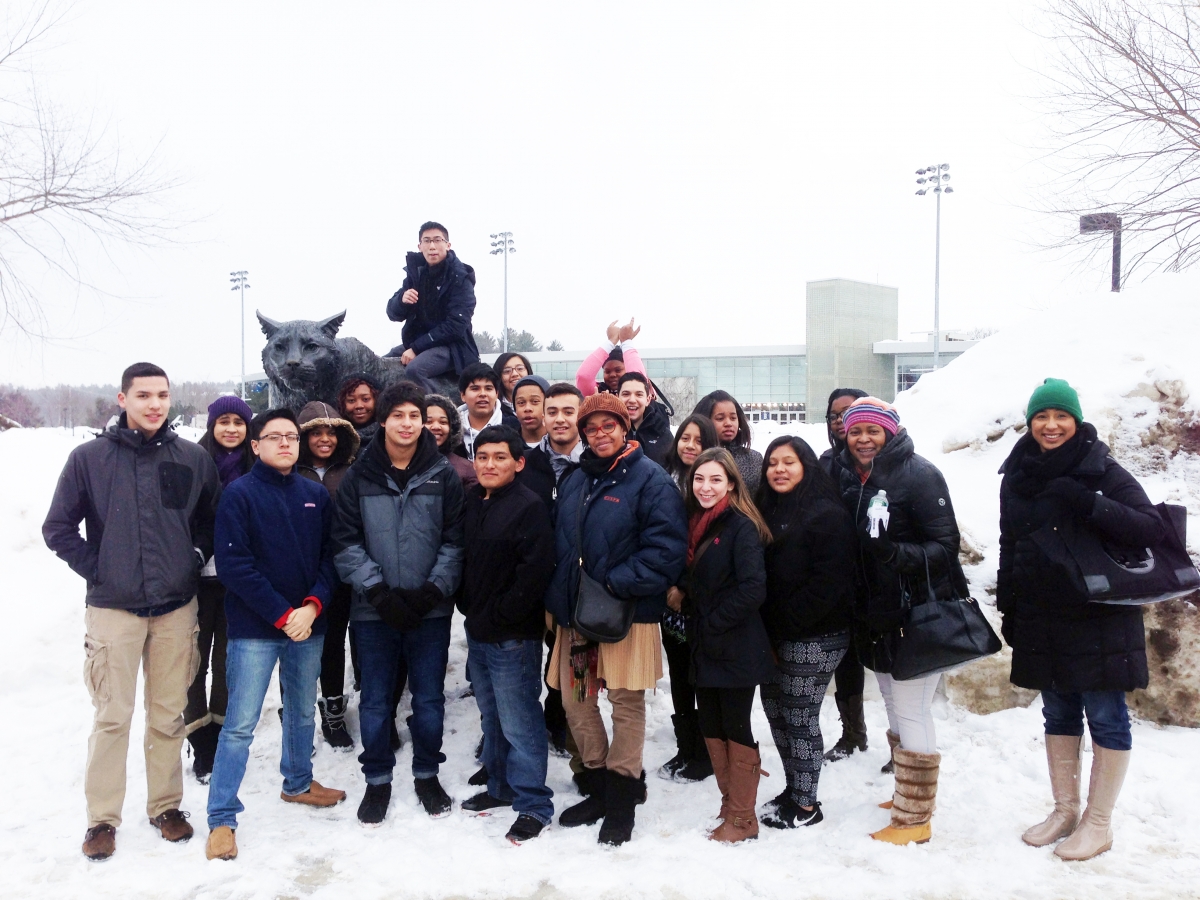
Sharing a Powerful History
For Haynes, the talk that students find so inspiring started when he read his first UNH application. In 2005, he joined UNH as a part-time applications reviewer, while he was teaching art at McIntosh College in Dover.
"I thought, 'Something's wrong. There are too many Cs and Ds here. Something is wrong,'" Haynes remembers, thinking that somewhere, this particular high school student must have had something happen that derailed their previous good grades.
He had that sense because that's exactly what happened to Haynes when he was in high school in New York City. "I did the same thing. I had a slip-up in high school. My grades were not at their best. But I had a mentor. I had Mrs. Miriam H. Powers, and she was the one who said to me: 'I don't care where you start this academic game; I'm concerned with where you finish this academic journey.'"
It's a phrase that Haynes repeats to high-schoolers he meets, and college students he mentors throughout their time at UNH.
Powers first came into Haynes's life when he was in junior high school; she was his art teacher and homeroom teacher who took him under her wing, mentoring him and fostering his love of art. When all of the other teachers would leave at 3 o'clock each afternoon, Powers stayed behind and helped Haynes and other students in whom she saw great potential.
"We would go out into her garden with a pencil and a piece of paper, and she would say, 'This is a petunia, this is a dogwood,' and we would draw leaves and branches and plants," he recalls. "Then we went out into midtown Manhattan, and one weekend it's Cooper-Hewitt, the next it was the Met, Modern Art, the Guggenheim ... She talked to me about lines and shapes and color and perfect proportion. This continued from seventh grade all the way through my master's of fine arts degree. Never once did she allow me to slip through her fingers."
So when it comes to his work in admissions at UNH, says Haynes, "I operate in her spirit. The way she mentored me, is the way I believe that I do in admissions. I'm mentoring, inspiring and encouraging students to believe that education will give you freedom and opportunity like nothing else in this world."
It's a powerful message, but Haynes knows that not everyone is affected by it the way he hopes.
"You know for sure, you're not going to able to touch everyone. But you'd like to believe that what little you gave the one who fell by the wayside ... you hope that one day they will pick up where we left off."
It was that way for Haynes when he lost his way academically in high school, but his mentor and his artistic work brought him back in line, eventually leading him to earn a master's of fine arts degree and embark on a successful career as an artist.
He is a visual storyteller who sees himself as he sees all artists, as "a cultural keeper and a cultural maker." His work reflects his own journey, as well as chronicles the journey of underrepresented or misrepresented people of color in America. He started painting, he says, "because I didn't want anybody to paint my story. So for the last 25 years, I have painted my own story as a first-generation, looking back at how my forefathers found success."
And he's quick to note that rather than being so different from each other, his two vocations truly do blend. "I do first-generation, multicultural outreach with underrepresented populations here for the university. It is that community that fuels the work that I do."
The university also helps him find his energy and inspiration for his artwork.
"There's just so much you can experience in a higher education environment. There's lots of information going on, just keeps the mind going and clicking."
The work he's currently painting now focuses on how different people can come together. "My work had focused on Reconstruction through the Civil Rights Movement, but now we're here. Now we see Ferguson, we're in the 2000s. We're looking at a system that is broken; why in the world are we still fighting against each other as opposed to working together?"
He believes higher education is the place where that divided way of thinking can be changed. So is he thinking about returning to the classroom? Not really, but if he did, it would be to teach art, and utilizing the arts to make a difference.
He describes himself as a spiritual man, who says he lives to help others.
"That's the way I try to run my life. The purpose, every day you live, is to make someone else's life better than the day before. Otherwise what is the purpose of living?"
Want to know more?
Check out the UNH Student Support Services, or contact counselor/coordinator Randy Schroeder here.
Related News
-
Written By:
Michelle Morrissey ’97 | UNH Magazine | michelle.morrissey@unh.edu











